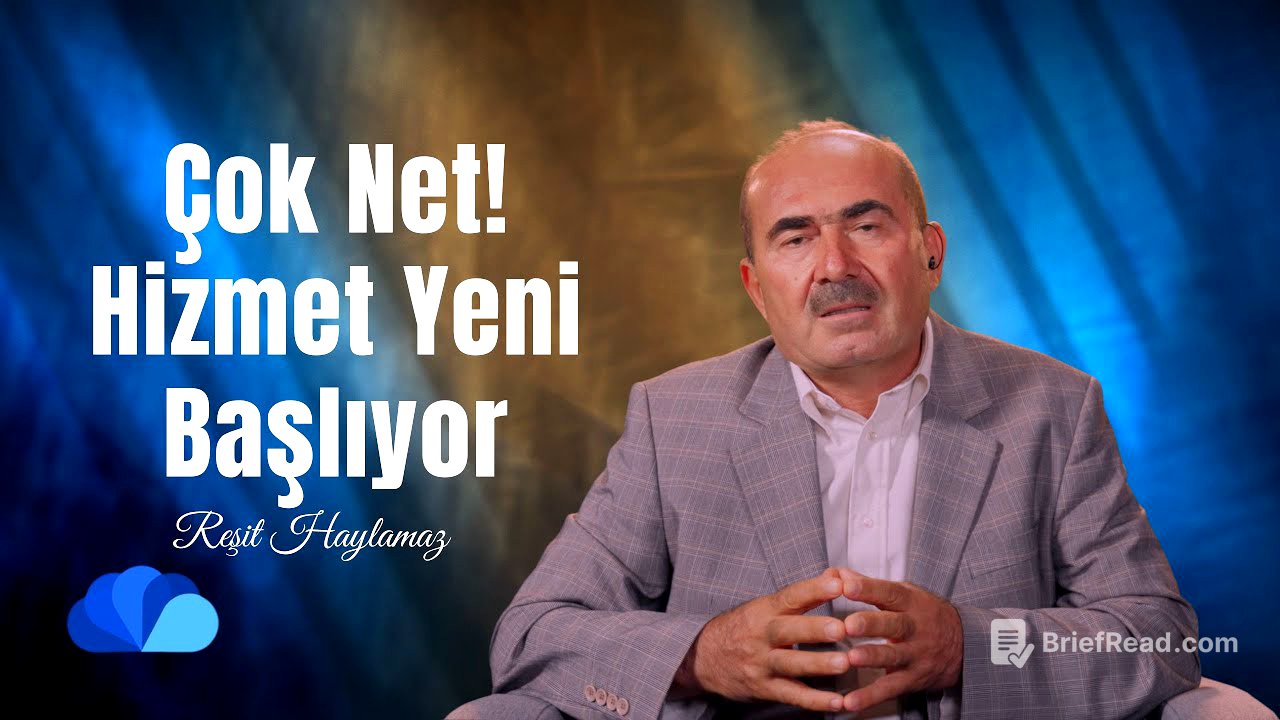TLDR;
This video discusses the importance of understanding life's lessons, utilizing time wisely, and maintaining moral integrity, especially in the face of adversity and the deceptive nature of social media. It emphasizes the need for self-reflection, consultation, and focusing on one's own actions rather than judging others. The speaker draws on Islamic teachings and historical events to illustrate these points, encouraging viewers to contribute positively to the world and uphold their values.
- Understanding life's lessons and parables.
- Utilizing time wisely and avoiding distractions.
- Maintaining moral integrity and self-reflection.
- Focusing on personal actions and avoiding judgment of others.
- Contributing positively to the world and upholding values.
Introduction: Reading Life Well and Utilizing Time [0:08]
The speaker begins by emphasizing the importance of being able to "read life well," similar to the teachings of Bediuzzaman Said Nursi, and understanding the parables of the Prophet Muhammad (peace be upon him). He uses the example of 24 gold coins to illustrate how time is a valuable gift from God, sufficient for many accomplishments if used wisely. During busy times, new projects and services emerge, highlighting the potential to overcome challenges. However, getting caught up in distractions leads to wasted time and empty efforts.
Living a Limited Life and Leaving a Mark [1:36]
The speaker reflects on the limited nature of life and the accountability we will face regarding how we use our time and opportunities. He stresses the importance of leaving a positive mark on the world by independently pursuing one's work and conveying cherished values to others.
Navigating the Deceptive World of Social Media [2:27]
The speaker discusses the deceptive nature of social media, describing it as a place where lies and wrongs are prevalent and incited. He warns against the psychological warfare and masked identities present on these platforms, where people may initially appear supportive but later denigrate values and create division. Drawing from the Quran, he notes that some individuals wear masks, feigning belief in the morning only to abandon it in the afternoon to disperse morale.
The Devil's Glamorous Deeds and the Fashion of Noise [5:51]
The speaker explains that the devil makes evil deeds look beautiful, leading people to see themselves as righteous and unaccountable to God. This results in unqualified individuals dominating discussions and creating noise, which he views as a temporary trend. He hopes that social media will eventually serve positive values, but currently, it feels like a destructive fire.
Victims and Victimizers on Social Media [7:29]
The speaker describes social media as a space where judgments are built on lies and crumbs of information, infringing on the rights of large groups. He identifies two groups of people: those influenced by the negativity and those who instigate it, with the former being the real victims. He notes that some individuals seem driven by unmet expectations and a need to be at the center of attention, seeking to prove themselves right even at the expense of others.
Accounting and Self-Reflection [10:09]
The speaker emphasizes the importance of self-reflection and accounting for one's actions, rather than constantly judging others. He criticizes the tendency to announce family issues publicly and the reliance on fragmented information to make incorrect judgments. Drawing on Islamic teachings, he states that a loyal person addresses problems directly with the concerned party, rather than gossiping or speaking openly about them.
Consultation and Preserving Wealth [12:35]
The speaker discusses the importance of consultation and respecting the decisions made collectively. He cautions against revisiting past discussions to assert one's correctness, as it undermines the spirit of consultation. He stresses the need to preserve wealth and differences within a business, ensuring that every step taken solves a problem and is discussed appropriately with the relevant person.
Badr from Mecca and Medina: Resetting and Rebuilding [13:53]
The speaker contrasts reading the events of Badr from the perspectives of Medina and Mecca. From Medina, Badr is a pure victory, but from Mecca, it represents the resetting of years of accumulation and an explosion of hatred. He notes that the Prophet Muhammad (peace be upon him) started rebuilding from scratch after this destruction, transforming Mecca within a few years.
Redefining Tensions and Crisis Management [15:21]
The speaker discusses redefining the tensions of the Age of Happiness by re-evaluating historical events with literature of that day, and viewing them from the perspectives of various kingdoms and empires. He mentions two upcoming books, one on crisis management and the other on security, which will examine these events and bring them to light again.
Consultation and Leadership in Uhud [16:14]
The speaker recounts the events leading up to the Battle of Uhud, emphasizing the Prophet's (peace be upon him) consultation with his companions. Despite his own inclinations, he accepted the majority's decision to fight outside the city. The speaker highlights the importance of a leader's determination, especially during times of uncertainty and crisis, and notes that consultation is a system that benefits everyone until the end of time.
Learning from Uhud and Maintaining Internal Harmony [20:01]
The speaker reflects on the lessons of Uhud, emphasizing the need to learn from past mistakes while maintaining internal harmony and preventing negativity from disrupting progress. He cites a hadith about expressing intentions clearly but acting with the afterlife in mind. He stresses the importance of consulting with the person in question before reaching a conclusion and ensuring the accuracy of information received.
The Incident of Tuğme: Justice and Accurate Information [23:05]
The speaker recounts the story of Tuğme, who stole someone's armor and framed a Jew for the crime. Despite the evidence pointing to the Jew, God sent down verses preventing the Prophet (peace be upon him) from passing judgment against him, defending the rights of the Jew. This story illustrates the importance of accurate information and avoiding judgment unless certain of the facts.
Breaking Free and Examining Our Stance [26:00]
The speaker urges listeners to break free from manipulative games, examine their stance on issues, and take a step back to assess the situation. He references Ocavendi's choice of silence when speaking out loud would have been detrimental. He emphasizes the need for self-examination and accounting, ensuring loyalty to the principles of service and making the most of opportunities.
Acting as Prosecutors Towards Ourselves and Lawyers Towards Others [28:39]
The speaker stresses the importance of acting as prosecutors towards ourselves and lawyers towards others, combining willpower with reason, and assessing the purpose and impact of our actions. He advises looking at who benefits from our words and actions, taking a stance accordingly.
The Service is Just Beginning [30:42]
The speaker challenges the notion that the service is over, asserting that it is just beginning. He recounts a conversation with his teacher, who emphasized the importance of reaching out to those in solitary confinement to show them that the service continues to grow. He notes that the teacher gradually brought accumulated knowledge to the global stage and instilled a discipline within the committee, which operates with remarkable consistency.
The Thread That Makes a Rosary [33:49]
The speaker uses the analogy of a rosary to explain the importance of values in uniting individuals. He states that the thread that holds the beads together represents the values that define us, and we must focus on internalizing these values. He also references Bediuzzaman Said Nursi's explanation of why Ali's caliphate fell after the three caliphs, noting that the turmoil in society could only be overcome by someone as strong-willed as Ali.
Supporting Those Who Carry the Burden of Service [35:20]
The speaker emphasizes the difficulty of carrying the burden of service and the need to support those who do so. He encourages directing them to improve and make better use of opportunities, rather than constantly criticizing them. He cautions against stirring up people's minds and worlds, urging a focus on one's own work and realizing that our actions are ultimately for ourselves.
The Sensitivity of Not Returning to the Land of Hijra [36:30]
The speaker discusses the sensitivity of not returning to the land of Hijra (migration), referencing the Prophet Muhammad's (peace and blessings be upon him) actions after migrating from Mecca. He notes that the Prophet (peace and blessings be upon him) only visited Mecca three times after the Hijra, each time under specific circumstances, and never gave the impression of returning permanently. He highlights the companions' sensitivity to this issue, citing examples of their reluctance to die or be buried in Mecca.
God's Will and the Migration of Today [42:39]
The speaker reflects on the current migration of people from their countries, seeing it as God's will to convey His cause to everyone in the world. He notes that even oppression can serve a greater purpose, as it has given those experiencing it a credit of confidence in the world. He integrates this with the companion's statement that they will go to every place where the sun rises and sets, carrying the cause to every house and tent.
The Bible Community and the Revival of the Work [45:15]
The speaker discusses the potential for the revival of the work in geographies where the Bible community lives. He references Surah Al-Fath and its description of the characteristics of believers, noting that these characteristics are exemplified in the Torah and the Bible. He interprets this as a sign that the revival of the work led by Muhammad (peace be upon him) will take place in these areas, with a surprise and abundance of yield.
Focusing on the Big Picture and Avoiding Complacency [51:54]
The speaker urges listeners to focus on the big picture and avoid getting bogged down in trivial matters. He emphasizes the need to eliminate complacency and inertia, as there is much work to be done. He quotes Aymaz Abi, who would often say, "Let's get down to business. Customers are waiting," reminding them not to leave people waiting empty-handed.
Hocafendi's Methodology and the Magazine Çağlayan [52:55]
The speaker recounts the story of how the magazine Çağlayan was created after other magazines were shut down. He describes Hocafendi's methodology in selecting articles, ensuring a mix of science, social sciences, and literature, mirroring the style of the Quran. He also shares an experience of working with Hocafendi on the magazine's layout during the Covid pandemic, witnessing his unwavering mental faculties despite his physical ailments.
Hocafendi's Will and Judgment [57:00]
The speaker defends Hocafendi's will and judgment, refuting claims that he was easily misled or influenced. He emphasizes that Hocafendi was a man of will until his last moment and that those who suggest otherwise are projecting their own problems. He urges listeners to speak the truth, examine their own motives, and consider the purpose and impact of their work.
The Importance of Discernment and Avoiding Blood Feuds [59:13]
The speaker stresses the importance of discernment and avoiding blood feuds. He cautions against bringing up past issues to attack current individuals, turning resolved problems into ongoing conflicts. He emphasizes that the service continues to purify itself, removing rust and dust like a bellows.
The Timing is Crucial [1:00:58]
The speaker shares an anecdote about Hocafendi's advice on addressing problems, emphasizing that "the timing is crucial." He recounts how Hocafendi compared a problem to a boil, stating that intervening too early or too late can have detrimental consequences. He stresses the importance of taking time to assess a problem, ensuring that it is accurately understood, and allowing those responsible to take action without interference.
The Winner is Clear [1:04:37]
The speaker concludes by emphasizing the importance of focusing on the space that has opened up before us and avoiding early retirement due to negativity. He states that the differences in perspective can serve as a vaccine, boosting the body's immune system. He reiterates that the goal is to gain the approval of God Almighty and carry the cause to those in need. He emphasizes the need to write down everyone's concerns and use them as an early warning system, purifying the body and preparing for the future. He states that the outcome is clear, and all the words and phrases will evaporate when the waters calm down. He emphasizes that our stance in this process will determine whether we build our future or destroy it.









